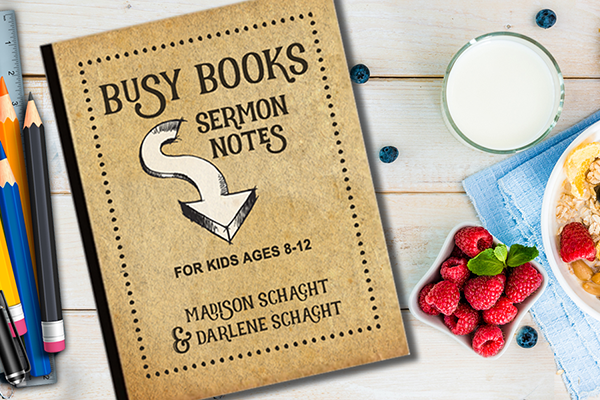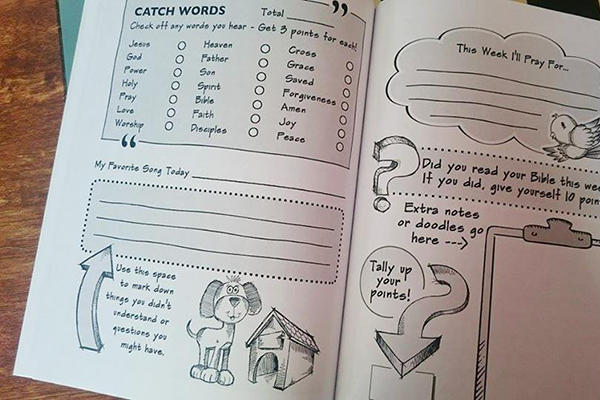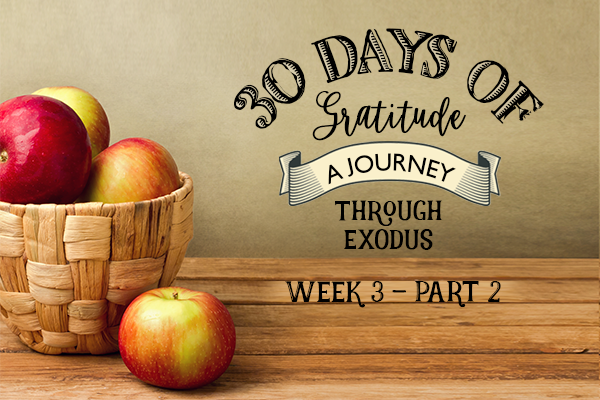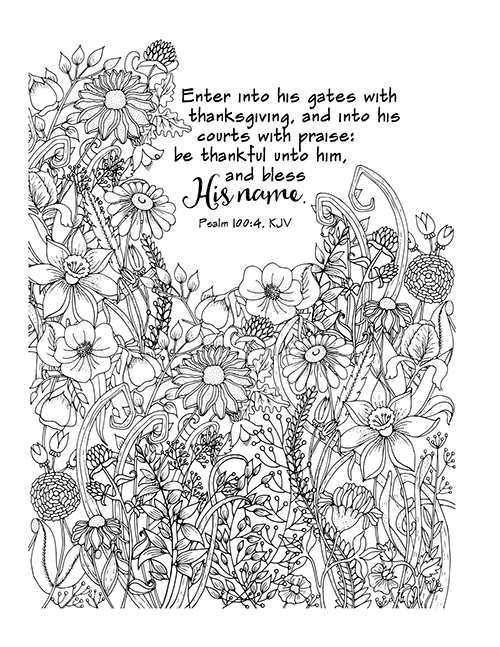Before our recap this week, I just wanted to pop in to share this Christmas idea with you…
If you’re looking for an affordable and AWESOME Christmas gift for your kids, your grandkids, your nieces, or nephews, BUSY BOOKS: SERMON NOTES FOR KIDS are absolutely amazing!!! Available at Amazon: http://amzn.to/2fnqBDj (affil link)
My daughter and I created these books earlier this year and they’ve had rave reviews. In fact we’ve had several churches ordering them in bulk, and kids love them!
Busy Books: Sermon Notes for Kids provide children with a fun and exciting way to learn, take notes, and ask questions. A weekly point system makes learning fun, while encouraging children to come prepared and be prepared to listen. In this book kids will find:
- A section for sermon notes
- A Sunday morning checklist
- A keyword checklist
- A place to write their favourite song
- A section for questions they might have
- An area for prayer requests
- A spot for extra notes or doodles
The book is complete with three pages per week for 52 weeks. All you have to do is pack a pen and a gold star!

[otw_shortcode_button href=”http://amzn.to/2fnqBDj” size=”large” icon_position=”left” shape=”radius” color_class=”otw-red”]BUY NOW AT AMAZON[/otw_shortcode_button]

[otw_shortcode_button href=”http://amzn.to/2fnqBDj” size=”large” icon_position=”left” shape=”radius” color_class=”otw-red”]BUY NOW AT AMAZON[/otw_shortcode_button]


Note: Some of you have asked when we’ll be studying the rest of Exodus, since this study is only chapters 1-15. Here’s the answer to that: because Christmas is around the corner, I’ll be hosting Quieting Your Heart for the Holidays after this study, like we did last year. We’ll return to part of Exodus in the new year.
Below are my notes for the week 3, Exodus chapters 9-12 (12 will be added later this weekend).
Don’t forget to pick up your coloring page at the bottom of the post. Have a great weekend!
P.S. Don’t forget to join in our 30 days of gratitude each day. You can find those posts on my facebook page too!

Exodus 9 – The Purpose of the Plagues
Reading through chapter nine, studying plague after plague, I got wondering—why did God let this continue? Why didn’t He just free the people in the first place instead of having Moses ask Pharaoh for his permission again and again? If God could turn water to blood, certainly He could turn Pharaoh to dust. In fact, He could have prevented Pharaoh from being born in the first place. The answer is found in verse 16 of this chapter:
“And in very deed for this cause have I raised thee up, for to shew in thee my power; and that my name may be declared throughout all the earth.” Exodus 9:16
Pharaoh was brought into this world for a reason, he was raised for a purpose, and he was given an opportunity to harden his heart, so that through his disobedience God would prove Himself to both His people and to the rest of the world.
God’s sovereignty and power was revealed through each and every one of the plagues. There wasn’t a stone left unturned. Every detail of the Exodus, including the many times that Pharaoh hardened his heart, was composed for a reason.
God knew Pharaoh before he was born. He knew what made him tick. He knew that Pharaoh was proud and that pride was the very thing that would cause him to harden his heart. He knew Pharaoh better than Pharaoh knew himself, and so He used Pharaoh’s weakness to make His power known to the world.
God sent Moses to warn Pharaoh of the upcoming plagues, but each time he did, Pharaoh turned his back on the Lord:
Verse 20 and 21 reveal Pharaoh’s heart, and also the heart of his people, “He that feared the word of the Lord among the servants of Pharaoh made his servants and his cattle flee into the houses: And he that regarded not the word of the Lord left his servants and his cattle in the field.” Exodus 9:20-21

Exodus 10 – The Eighth and Ninth Plagues
I couldn’t help but notice the question that God posed to Pharaoh in verse 3: “How long will you refuse to humble yourself before me?”
He didn’t say, how long will you refuse to obey me, but instead he cut right to the heart of the matter—Pharaoh’s pride stood in the way of obedience.
The Egyptians were starting to blame Pharaoh for this disaster. There was pressure on him from all sides, but instead of yielding to the pressure in humility, he continued to harden his heart.
He was more concerned about his pride than he was about the destruction of their land.
As we’re into chapter 10, we see God mocking their most beloved of gods. Osiris, the god of vegetation (also the giver of life) was one of their greatest (if not THE greatest) gods. According to the myth, his brother Seth killed him and dismembered his body in a struggle for power. His wife used magic to bring him back to life. Their son avenged his father thus becoming the king of Egypt, while Osiris became the king of the dead. The plague of the locust was a challenge that mocked their beloved king and his family. (http://historylists.org/…/list-of-15-most-worshiped-ancient…)
Ra the sun god, they believed, was born every morning. He was responsible for the resurrection of the pharaohs of Egypt. When darkness fell upon Egypt it remained for three days. This delay speaks volumes to me as it proved both the falsehood and death of their god, and it displayed God’s power over life. If it was merely dark for an afternoon they would have assumed that their god returned in the morning, but when morning came again, and again, and again—the darkness remained, proving their god was a lie, and that Pharaoh was indeed destructible.

Exodus 11 – The Final Plague
Exodus 11 is a short chapter with only nine verses, but it’s powerful nonetheless.
God was unleashing the final plague—the death of the firstborn throughout Egypt. He was setting the stage for the Passover, which was a shadow of things to come.
Before I get ahead of myself, I want to point out that while the other plagues mocked the many gods that they worshipped, this one mocked Pharaoh himself–a false god indeed—and perhaps the one Pharaoh worshipped the most.
The firstborn was highly regarded at this time, for two reasons. One is that a first-born son was in line for the family inheritance. The first-born took the throne in some cases, and the blessing in others. First born is also synonymous with power as we see Christ referred to as the first-born of all creation in Colossians 1: 15-17.
By destroying the first-born of Egypt, God showed that obedience trumped lineage.
Let’s not forget what God told Pharaoh in Exodus chapter 4:
“And thou shalt say unto Pharaoh, Thus saith the Lord, Israel is my son, even my firstborn: And I say unto thee, Let my son go, that he may serve me: and if thou refuse to let him go, behold, I will slay thy son, even thy firstborn.” – Exodus 4:22-23
The first born had a birthright, they had an inheritance, and they had privileges the others didn’t, but God has always reserved the right to choose the first-born as He did with Jacob when He chose him over Esau.
This was a foreshadow of the New Testament, where God gave His only begotten Son so that we might be joint heirs with Him through obedience to the cross.
“Blessed be the God and Father of our Lord Jesus Christ, which according to his abundant mercy hath begotten us again unto a lively hope by the resurrection of Jesus Christ from the dead, to an inheritance incorruptible, and undefiled, and that fadeth not away, reserved in heaven for you.” 1 Peter 1:3-4

Exodus 12 – The Passover
The month was Abib, and later called Nisan. In this chapter, the month of Abib was established as the first of months. This becomes an interesting month for God’s people as they establish the first Passover on the 14th of Nissan.
The comparison between the Passover and the death of Christ is a parallel unlike any other. Every detail of the Passover was implemented for a reason. So many of the details can be found in the account of the crucifixion. It’s really amazing when you start to compare the two.
Looking at Leviticus chapter 23, we see that the Passover was on the fourteenth day of the first month and that the feast of unleavened bread the next day.
In verse 6 God instructs the Israelites to kill the lamb in the “evening.” Dake’s Annotated reference Bible says, “Jews had two evenings: the first one was at 3:00 p.m., when the evening sacrifice was killed; and the second one was at 6:00 p.m., near sunset.” But here’s the thing, the Jewish day started at sunset (around 6am), making 3pm (our time) the ninth hour.
When we look at the crucifixion of Jesus in Mattew chapter 27, we see that He gave up the ghost at the ninth hour.
The spotless lamb was a foreshadow of the spotless lamb of God—Jesus Christ.
Notice how they were instructed to take the blood in verse seven and put it on their doorposts. This blood marked their protection, as the blood of the Lamb also marks ours.
Notice how they were instructed to eat the flesh in verse 8. John 6:53 says, “Then Jesus said unto them, Verily, verily, I say unto you, except ye eat the flesh of the Son of man, and drink his blood, ye have no life in you.” So what is this eating all about? When we believe in Jesus—when we truly believe that He died on the cross and shed His blood for mankind, we symbolically eat of His flesh and drink of His blood. As they sat in their homes eating, they demonstrated their faith in the blood of the lamb and God’s protection over them.
And there’s more. They were to dress themselves in a manner, worthy of travel—with their loins girded (tunics lifted and tied), shoes on their feet, and a walking stick. They were to be ready for the call as believers today are instructed to be ready at all times for the coming of our Lord.
As the angel of death passed over the homes, they were protected through faith in the blood and the death of the lamb.
In previous chapters, we talked about the various gods that were mocked. In this chapter, the Lord says, “And against all the gods of Egypt I will execute judgment: I am the Lord..” (v. 12)
The next day marked the beginning of the feast of unleavened bread. Notice how it began with a day of holy convocation. This was a Sabbath day which wasn’t necessarily the seventh day of the week, and it also ended with one. These were extra Sabbath days to them.
During the seven days of the feast they were to eat unleavened bread. Leaven is symbolic of sin as we see in Galatians 5:9 where Paul writes, “A little leaven leaveneth the whole lump,” in connection with obeying the truth. And so these feasts were a way of expressing their faith and obedience to God’s will.

Today’s Coloring Page
Click here to view and print your copy

